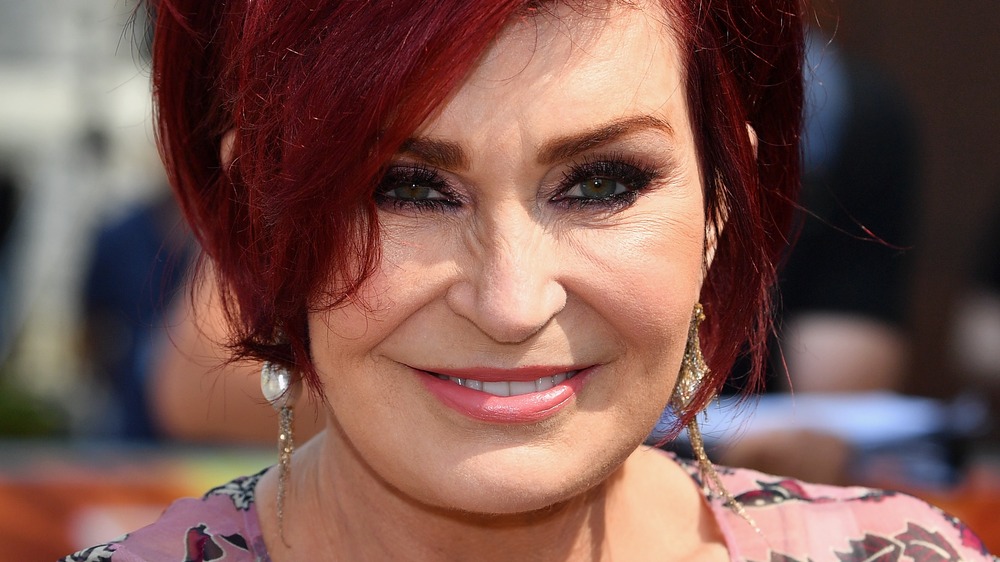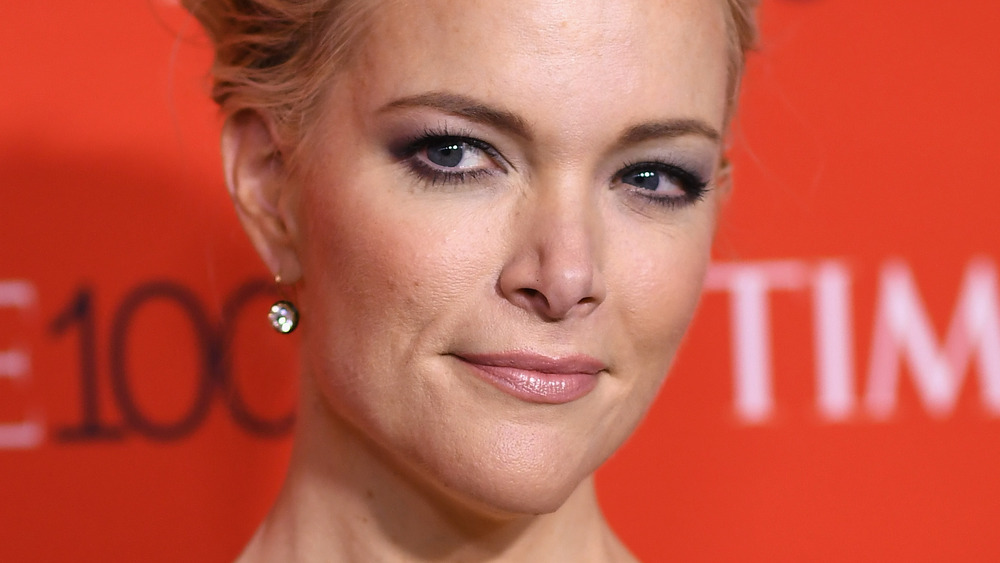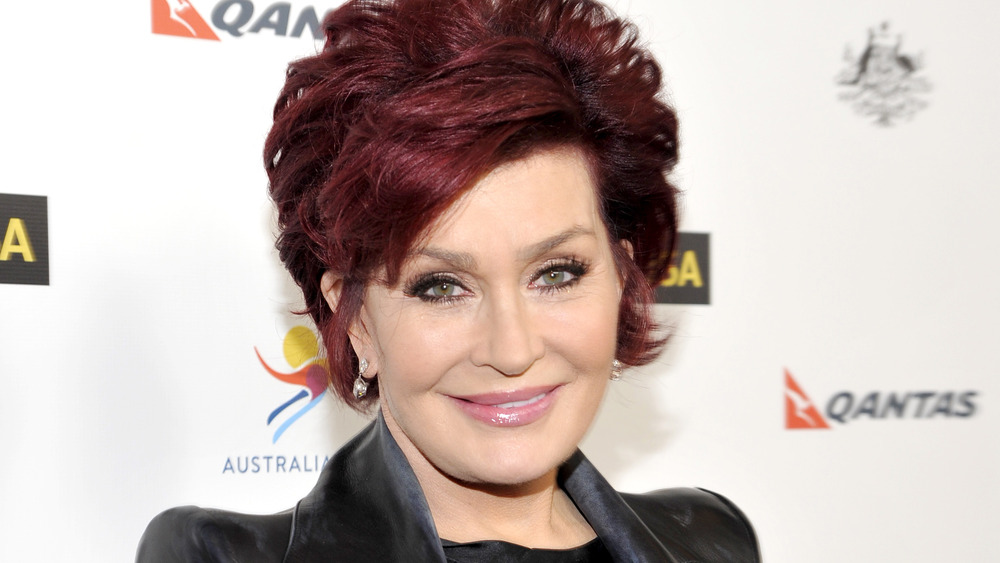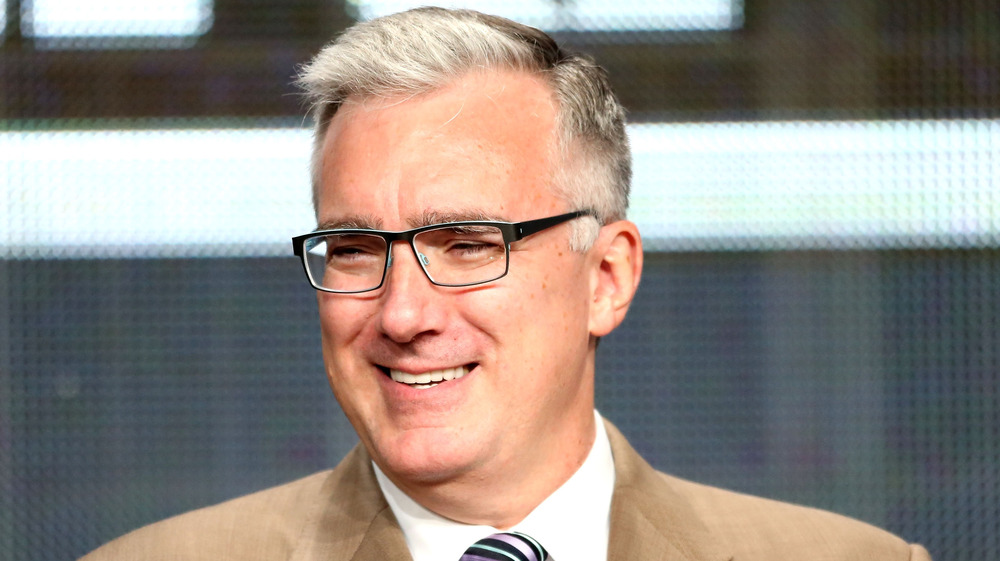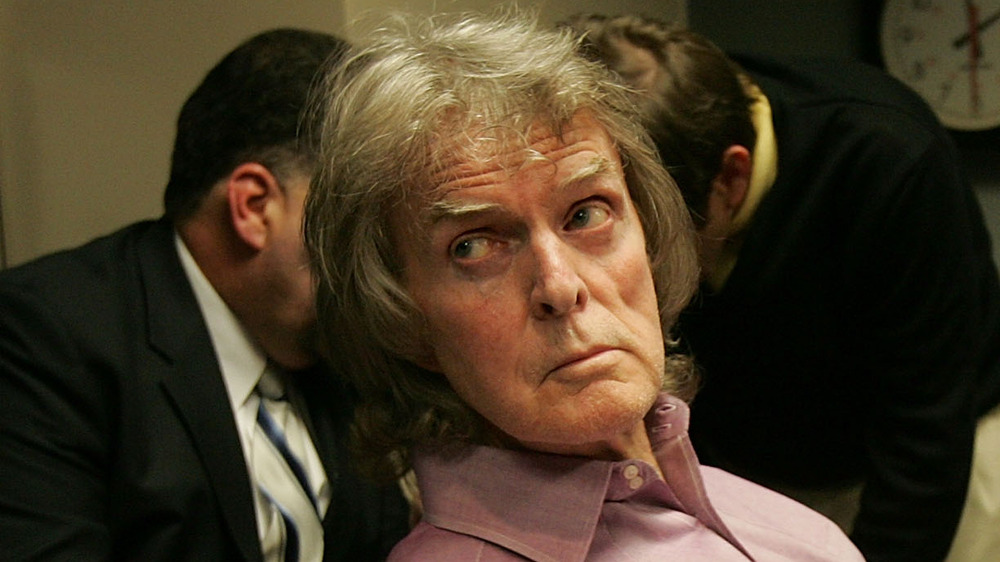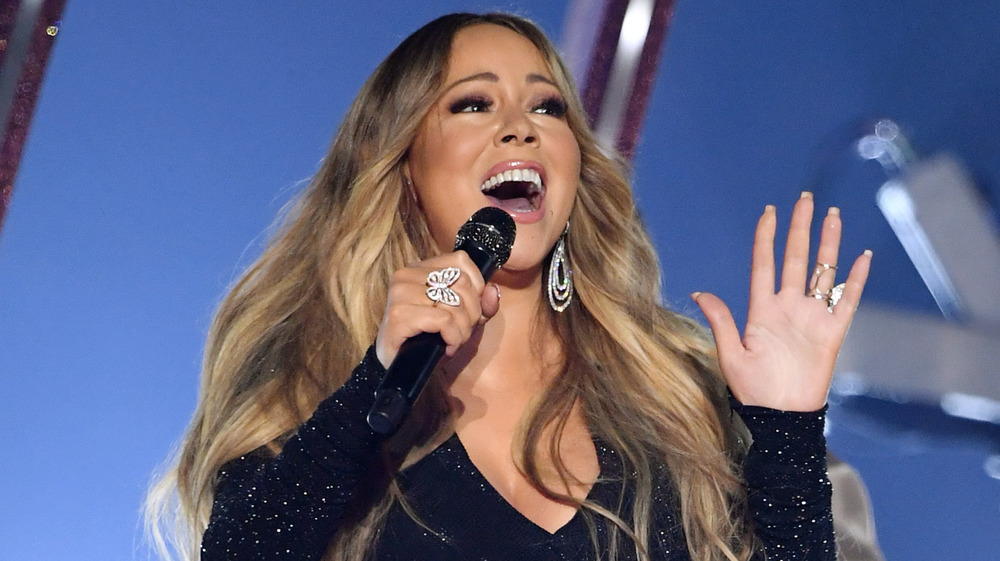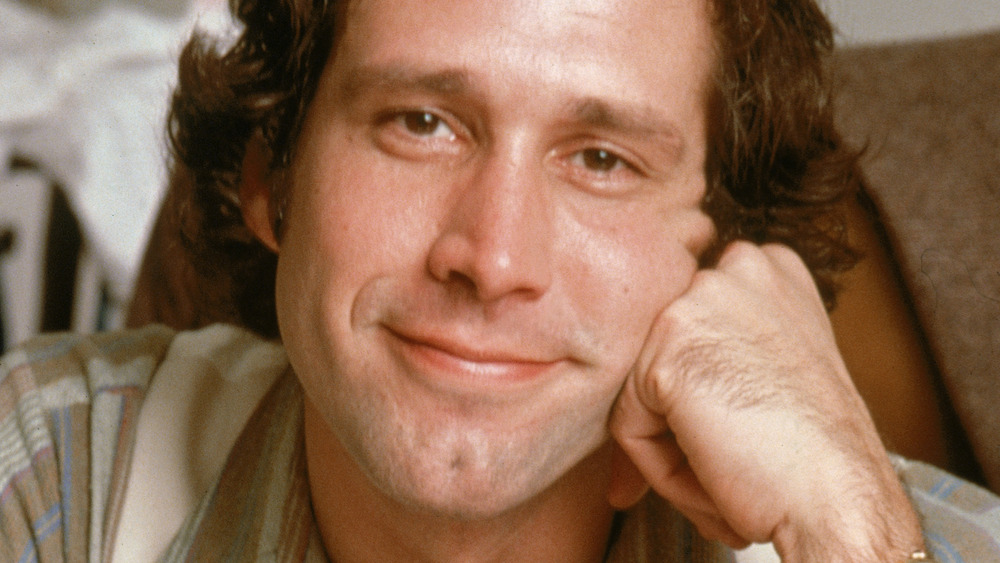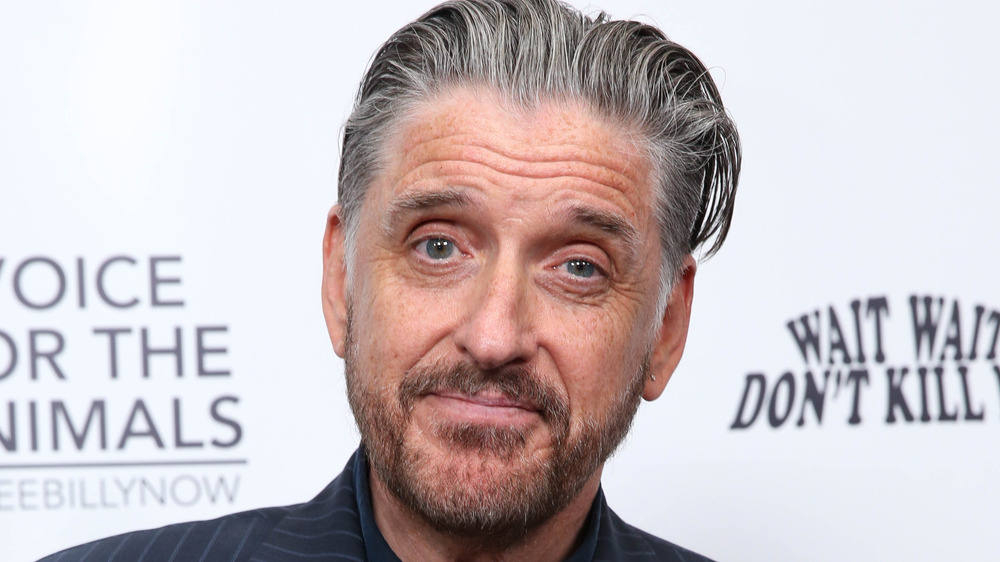Celebs That Were Paid Off To Quit
A clear and direct contract is generally a good idea for professionals of all stripes. It describes in no uncertain terms the work that one party expects of another, and exactly how much they'll be paid for that labor, and for how long and under a variety of circumstances. It's a legally binding document, and it protects both an employer and an individual, and for the latter, is a reassuring guarantee of payment.
However, some contracts may include language that gives an employer a contingency plan. If a host, actor, or musician they've hired at great expense doesn't work out for some reason, they've got the option of a buyout — paying out a large cash settlement to make the person go away, thus voiding the contract and allowing for a clean break. This happens with relative regularity in entertainment, cable news, and the music industry. Big companies get cold feet about an act, for various reasons, and want them to just go away. And so, they give them lots of money to do so. Here are some celebrities who kind of scored the ultimate gig: They got a huge sum of money to stop doing their job.
Conan O'Brien got $32.5 million to leave The Tonight Show
NBC so badly botched its handover of The Tonight Show during the early '90s retirement of Johnny Carson — the network reportedly feared losing both Late Night host David Letterman and Tonight Show guest host Jay Leno (the former eventually fled to CBS) that it tried to handle the next succession with an advance plan... which then went terribly awry. In 2004, Leno announced that he'd step down from Tonight... in 2009, at which point Late Night host Conan O'Brien would take over. Afraid to lose Leno to a competitor, however, NBC installed him in primetime with The Jay Leno Show, a critically-reviled and audience-ignored variety show airing five nights a week. Perhaps because of that poor lead-in or maybe because his oddball comedy didn't translate to The Tonight Show, O'Brien's ratings tanked. In early 2010, NBC proposed a shakeup: move The Jay Leno Show to 11:35 p.m., pushing The Tonight Show with Conan O'Brien to 12:05 a.m.
O'Brien was livid, and instead of accepting the new lineup, he negotiated his exit from NBC. The network cancelled The Jay Leno Show and gave The Tonight Show back to Leno. Meanwhile, in order to get O'Brien out of the way, NBC had to buy out his guaranteed contract in full, which, according to The New York Times amounted to $32.5 million remaining on his deal. NBC also had to pay around $12 million to O'Brien's senior staffers to void their contracts.
Megyn Kelly got three year's pay for one year of work
After 12 years with the heavily political Fox News, Megyn Kelly was eager to try something more middle-of-the-road, according to CNN, so she jumped to NBC for Megyn Kelly Today, a Today-affiliated daily hour that ran at 9 a.m. in most of the US. Vanity Fair reported that on her very first episode Kelly asked Russell Turner, a lawyer and gay man, in from of the cast of Will & Grace, "Is it true that you became a lawyer and you became gay because of Will?" Show star Debra Messing later commented on Instagram that she was "dismayed" by Kelly's actions and had "regret" over appearing on the show. Two days later, Kelly awkwardly tried to get guest Jane Fonda to admit to having had plastic surgery. Months later, Kelly told a fitness professional Maria Kang that she ought to turn fat-shaming "into a professional business, because some of us want to be shamed."
But what went wrong on Kelly's show was when she made remarks on a pre-Halloween episode, expressing confusion over why kids couldn't wear blackface as part of a costume. According to The Guardian, that incident led Kelly's agency to drop her, and within days, NBC cancelled Megyn Kelly Today. Only about halfway through a three-year contract worth $69 million, NBC got out of the Megyn Kelly business by paying out the remainder of what it owed her, or about $30 million.
ESPN gave Jemele Hill millions to go elsewhere
Primarily a print journalist for a variety of major newspapers, Jemele Hill joined ESPN in 2006 as a columnist for the network's website, according to The Hollywood Reporter. She soon began appearing as a commentator and panelist on First Take and SportsCenter, ultimately named a co-anchor of that seminal highlight show's daily 6 p.m. edition. Hill continued to do what had made her popular and successful, deliver her opinions, although her words proved too controversial for many.
In October 2017, Hill tweeted that President Donald Trump "is a white supremacist who has largely surrounded himself with other white supremacists," adding that she found him to be "the most ignorant, offensive president of my lifetime." (Trump responded in kind, tweeting that Hill was the reason why ESPN's viewership figures had "tanked"; White House press secretary Sarah Huckabee Sanders called Hill's comments "a fireable offense," according to Sports Illustrated.) ESPN did suspend Hill, but according to Vox, it was after a "second violation" of the company's "social media guidelines in which Hill arguably suggested NFL viewers boycott league-supporting advertisers, following Dallas Cowboys owner Jerry Jones promising to sit players who kneeled in protest during the national anthem.
In September 2017, Hill and ESPN parted ways. With two years left on a deal, the network sent the journalist packing with a reported $5 million+ contractual buyout to her name.
Sharon Osbourne got a huge payday when she left The Talk
The breakout star of MTV's comical, heavy metal reality show The Osbournes in the early 2000s: Sharon Osbourne, who parlayed her outspoken attitude into the talk show business. Following the short-lived The Sharon Osbourne Show, Osbourne joined CBS's The Talk as part of the program's multicultural and generation-spanning hosting panel.
In the days after Meghan Markle's revelatory interview with Oprah Winfrey, in which she alleged racially-charged actions on the part of the royal family, Good Morning Britain host Piers Morgan angrily asserted that he didn't believe anything Markle said (the latest in a lengthy series of diatribes against the former actress). Per TMZ, Morgan received criticism that his comments were racist in nature, and on The Talk, Morgan's friend, Sharon Osbourne, defended him, wondering why what he said was racist. This brought out a lot of Osbourne's past actions, according to Entertainment Weekly, with former The Talk cohost Leah Remini alleging that Osbourne demonstrated "vitriol, hatred, and bullying" behind the scenes, while writer Yashar Ali published reports that Osbourne had made racist and homophobic comments about cohosts Julie Chen and Sara Gilbert, respectively.
CBS placed The Talk on hiatus and conducted an internal investigation, according to Deadline. At the end of it, the network announced that Osbourne had decided to quit The Talk. According to Page Six, Osbourne's "departure agreement" included a payment of somewhere between $5 to $10 million.
MSNBC gave Keith Olbermann $17 million to leave
Keith Olbermann helped make MSNBC into the cable news world's left-leaning equivalent of the more conservative-skewing Fox News. But before he became a firebrand, Olbermann was a sportscaster, anchoring ESPN's flagship SportsCenter throughout the 1990s.
In 1997, according to Awful Announcing, Olbermann made the unprecedented switch from the fairly neutral and breezy world of sports journalism into the highly politically-oriented fray of news, hosting The Big Show with Keith Olbermann on MSNBC. Upset and burned out by too much coverage of the President Bill Clinton / Monica Lewinsky scandal (per USA Today) he retreated to sports broadcasting jobs for Fox and ABC before heading back to MSNBC for the primetime news and commentary series Countdown. In January 2011, MSNBC released a statement (via CNN) announcing Olbermann's departure, but providing no reasons behind the move. A number of behind-the-scenes, tension-causing factors, however, were at play, leaving Olbermann regarded as a somewhat shady figure behind the scenes of broadcast news.
According to Rolling Stone, he'd been suspended by the network in late 2010 for violating his journalistic objectivity by donating to three congressional campaigns. His annual salary at MSNBC was $7 million, which, per The Hollywood Reporter, he would "continue to collect for another year and a half" after the network cut him loose. According to TMZ, Olbermann's full exit package — which took his attorney seven weeks to negotiate — was in the neighborhood of $17 million.
Don Imus said nasty things and made $20 million for it
Don Imus was a popular radio personality for decades, syndicating the New York-based Imus in the Morning to hundreds of American radio stations for years. Distributed by CBS Radio and simulcast on MSNBC, Imus enjoyed making provocative remarks. On a broadcast of the show in 2007, Imus was discussing the Rutgers University women's basketball team and derisively commented on the mostly African-American group's collective appearance with a double slur, one that included both racist and misogynistic terminology, according to Reuters.
Days after the incident, CBS Radio and MSNBC issued Imus a two-week suspension. African-American community leaders, including Jesse Jackson and Al Sharpton, called for Imus to be fired for remarks Harvard University professor (and history of racial epithet scholar) Randall Kennedy called "terrible and reprehensible," per Reuters. CBS Radio heeded the call and terminated Imus. After the host threatened to sue over breach of contract, the network reportedly paid Imus $20 million to just walk away.
Mariah Carey essentially earned $70 million for one flop album
Mariah Carey can stake a claim to the title of biggest pop star of the 1990s. The 1991 Grammy-winner for Best New Artist, capable of a preposterous multi-octave voice, released seven multi-platinum albums and took 14 songs to #1 on the Billboard Hot 100 in the decade. But shortly after the turnover of the new millennium, Carey started to falter. In 2001, she made her movie star debut in Glitter, an '80s-set riff on A Star is Born, that wound up one of the worst-reviewed movies of the year. Even the soundtrack full of Carey songs didn't do that well, with leadoff single "Loverboy" stalling at #2 and the album moving just over a million copies, both letdowns for the usually Uber-successful singer.
The Glitter soundtrack was also the first of a four-LP deal Carey signed with Virgin Records earlier in 2001. Worth $80 million, it was one of the "biggest" recording contracts to date, according to the Los Angeles Times. But then it was a one-and-done deal. After the lackluster sales of Glitter, according to the The New York Times, Virgin bought out Carey's contract and made her a free agent. She'd already taken home $21 million from the label, and the buyout netted her an additional $28 million.
Chevy Chase earned millions because The Chevy Chase Show failed
When Johnny Carson retired from NBC's The Tonight Show in 1992, other networks finally had a shot at late night. Fox produced what looked like a viable entry in the fall of 1993 with The Chevy Chase Show, a nightly talkfest starring the funny and likable star of comedy classics Caddyshack, Vacation, and Fletch. The extremely loose Chevy Chase Show taped in Los Angeles on a set that included basketball hoops, toys, an operational fish tank, and a host desk with a built in piano so Chase, an accomplished musician, could play along with the house band.
Ultimately, The Chevy Chase Show was a mess. Ken Tucker of Entertainment Weekly graded the program an "F," calling out the "tedium" and "mind-deadening" nature of the show, as well as how it reran a comedy bit from its first week in its second week. Audiences stayed far away, and the show drew less than half of the ratings that Fox had promised advertisers, according to The New York Times. Fox pulled the plug after just six weeks, replacing it with In Living Color reruns. But the network paid dearly to cut and run. Not only did Fox have to offer free commercial time to unhappy Chase advertisers, it had to buy out the host's contract. According to the Los Angeles Times, Chase had a two-year hosting deal, and to nullify it, Fox had to pay somewhere between $6 million and $9 million.
Ann Curry got $10 million to depart Today
Following a decade as a reporter for local TV stations on the West Coast, Ann Curry joined NBC News in the '90s and worked her way up the corporate ladder. After anchoring NBC News at Sunrise, she served as a substitute newsreader behind Matt Lauer at Today, then inherited the position full-time in 1997, per The Christian Science Monitor, which she performed until June 2011 upon her promotion to Today co-anchor, replacing the departing Meredith Viera.
After just one year at that job, and a year of declining ratings, The New York Times reported that NBC had been secretly maneuvering to dump Curry. An audibly and visually upset Curry broke the news on Today, commenting "I never expected to leave this couch after 15 years." Reassigned a "foreign correspondent," NBC News had to pay Curry $10 million (what was left on a $20 million, two year contract) to leave Today, according to the New York Post.
Craig Ferguson got paid to not host The Late Show
In April 2014, David Letterman announced his intention to retire from The Late Show in one year's time, setting off speculation on who would replace him as the host of CBS's 11:35 p.m. nightly show. One of the most obvious choices to get the job: Craig Ferguson, the freewheeling comedian and former co-star of The Drew Carey Show, who hosted the show that followed Letterman, The Late Late Show, since January 2005.
Bolstering the notion that Ferguson could take over, according to the New York Post: Ferguson had a clause in his contract with CBS that awarded him the job of host of The Late Show upon Letterman's exit. If the network opted to go with someone else, a thoroughly likely option, as hosting the earliest late night show on a major network is one of the most coveted, lucrative, and influential jobs in television, it would have to pay Ferguson a $5 million penalty (which the New York Daily News pegged to actually run north of $8 million).
Just a week after Letterman announced that he'd vacate The Late Show, CBS publicly announced his successor: The Colbert Report host Stephen Colbert. That means Ferguson pulled in a lot of money to not become the new David Letterman.
Wilco got paid twice by the same label for an album it declined
After the influential country-rock band Uncle Tupelo split up in 1994, according to AllMusic, former member Jeff Tweedy and others formed a new band, Wilco, which would go on to far more success and fame than their previous outfit. Two of the band's late '90s albums, Being There and Mermaid Avenue ranked on Rolling Stone's "100 Best Albums of the '90s" list, setting up big expectations, commercially and critically, for Wilco's early 2000s output. Signed to Warner Bros. Records subsidiary Reprise Records, Tweedy and the band recorded a progressive, artsy, experimental alternative rock-folk opus, called Yankee Hotel Foxtrot. It was so out there that when Wilco turned it into executives at Reprise, the label rejected it, on account of how it was strange and uncommercial, according to The Buffalo News.
Wilco and the company worked out a deal, according to Magnet: The band could have the rights to Yankee Hotel Foxtrot and get out of its contract with Reprise in exchange for $50,000. Then, in a surprise move, per Diffuser, Reprise let Wilco walk away for free. At that point, about 30 different labels offered Wilco huge sums of money for Yankee Hotel Foxtrot, and near the end of 2001, the band went with Nonesuch Records, which, like Reprise, was a division of Warner Bros. In effect, a company paid Wilco to make an album, and then paid them for the same album again.

